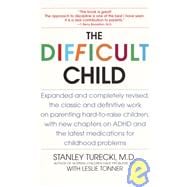
Note: Supplemental materials are not guaranteed with Rental or Used book purchases.
Purchase Benefits
What is included with this book?
| Questionnaire: Do You Have a Difficult Child? | p. ix |
| A Personal Introduction | p. xiii |
| Some Children Are Born Difficult | p. 1 |
| Do You Know This Child? | p. 3 |
| Mothers Under Siege | p. 28 |
| The Ripple Effect | p. 43 |
| "But Is He ADHD?" | p. 63 |
| A Day in the Life of a Difficult Child | p. 86 |
| A Program for Your Difficult Child | p. 103 |
| Introduction | p. 105 |
| Evaluating Your Situation: The Study Period | p. 109 |
| Regaining Adult Authority: Discipline That Works | p. 128 |
| Managing Temperament: Understanding in Action | p. 150 |
| Putting It All Together: The Expert Parent | p. 182 |
| Coping with a Difficult Infant: The First Year | p. 212 |
| Beyond the Child: The Family and the World Outside | p. 225 |
| If You Need Further Help: Working with Professionals | p. 248 |
| Conclusion: What Does the Future Hold for My Child? | p. 274 |
| Recommended Reading | p. 283 |
| Appendix | p. 285 |
| Index | p. 291 |
| Table of Contents provided by Syndetics. All Rights Reserved. |
The New copy of this book will include any supplemental materials advertised. Please check the title of the book to determine if it should include any access cards, study guides, lab manuals, CDs, etc.
The Used, Rental and eBook copies of this book are not guaranteed to include any supplemental materials. Typically, only the book itself is included. This is true even if the title states it includes any access cards, study guides, lab manuals, CDs, etc.
Excerpted from The Difficult Child by Stanley Turecki, Leslie Tonner
All rights reserved by the original copyright owners. Excerpts are provided for display purposes only and may not be reproduced, reprinted or distributed without the written permission of the publisher.